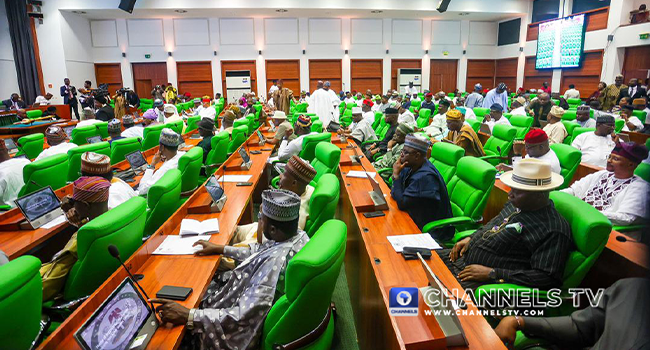832
By Tracy Moses
The House of Representatives Ad-hoc Committee investigating the financial, regulatory and security implications of cryptocurrency usage and Point-of-Sale (POS) activities has raised a fresh alarm over Nigeria’s worsening POS-related fraud and the rise of unauthorised crypto transactions within the sector.
Chairman of the Committee, Hon. Olufemi Bamisile, speaking during the panel’s resumed investigative hearing with fintech operators, POS associations, regulators and security agencies on Monday, said recent revelations point to deep-seated vulnerabilities in the country’s fast-growing digital payment ecosystem.
Since the introduction of the cashless policy and the rapid expansion of agency banking, POS terminals have become the most accessible financial tool for millions of Nigerians, especially in rural and underserved communities. The system has strengthened financial inclusion, eased pressure on banks and expanded digital payment adoption nationwide.
However, the rapid expansion, accelerated by the COVID-19 pandemic and the 2023 naira redesign crisis, created a sprawling sector with limited oversight. As millions of POS agents emerged, many without proper verification, criminal networks quickly exploited the gaps.
What began as isolated thefts evolved into coordinated fraud schemes involving cloned terminals, identity theft, SIM swaps, social engineering and cross-platform cyberattacks. The increasing use of cryptocurrency, still largely unregulated in Nigeria, added another layer of complexity by enabling anonymous transactions and faster laundering of illicit funds.
Bamisile said the Committee has been inundated with reports of fake POS terminals, unregistered operators, anonymous transactions and weak Know-Your-Customer (KYC) procedures, exposing citizens to rampant financial crimes and cybersecurity threats.
“We are extremely concerned about the surge in fraudulent activities tied to POS services,” he said. “The proliferation of unverified agents, cloned terminals and lax KYC measures is creating dangers that should never exist in a modern financial system.”
He also warned that a growing number of POS operators are now offering cryptocurrency and digital-asset services without authorisation from relevant regulators. Such practices, he said, create loopholes that can facilitate money laundering, terrorism financing and data manipulation.
“There is credible intelligence indicating that some POS operators now run backdoor crypto services,” he said. “This raises major concerns around AML/CFT compliance and the misuse of platforms designed for simple financial transactions.”
Bamisile further revealed that the Committee has received reports of fraudulent company registrations at the Corporate Affairs Commission (CAC), where shell firms are being created using stolen National Identification Numbers (NINs) and Bank Verification Numbers (BVNs) to open accounts and channel illicit funds through unmonitored POS outlets.
He also criticised the growing trend of major fintech companies storing sensitive customer data on foreign servers, saying it undermines the ability of Nigerian regulators and law-enforcement agencies to trace suspicious transactions or carry out real-time compliance checks.
“This poses a clear national-security risk,” he said. “When critical financial data is housed offshore, our regulatory hands are tied.”
Despite the troubling revelations, Bamisile assured stakeholders that the investigation is not a witch-hunt. He acknowledged that operators face challenges arising from overlapping regulatory mandates, inconsistent policies and multiple compliance requirements.
“Our role is to harmonise the system,” he said. “We want a regulatory framework that protects consumers, strengthens security and supports innovation without stifling growth.”
The Committee will continue engagements with relevant agencies and industry leaders before submitting its final report to the House.
The National President of the Association of Digital Payment and POS Operators of Nigeria (ADPPON), Mr. Paul Okafor, told lawmakers that the POS ecosystem has descended into what he described as “a full-blown crisis.”
He said the explosive growth of POS services has overwhelmed regulatory capacity, enabling criminal groups to exploit loopholes. While POS agents grew from 50,000 in 2017 to over 2.3 million today, regulatory capacity, he noted, increased by “less than 10 percent.”
“This massive imbalance is the root of the crisis we are battling,” he said. “The regulators are not incompetent; Nigeria’s digital finance sector simply grew faster than they could keep up.”
Citing data from the Nigeria Inter-Bank Settlement System (NIBSS), Okafor said POS and digital-payment fraud cost Nigerians N17.67 billion in 2023. The situation worsened dramatically in 2024, with losses rising to N52.26 billion.
Attempted fraud across financial platforms also surged by 338 percent, with POS fraud accounting for more than a quarter of all reported cases. Industry tracker FITC recorded a 95 percent increase in POS fraud in the fourth quarter of 2024.
“More than 38,000 POS fraud cases were officially reported in one year,” he said. “But we estimate that over 70,000 cases go unreported because victims simply give up.”
He also warned that POS outlets are increasingly being used to cash out ransom payments and other criminal proceeds. Security agencies in some states, he said, have reported that nearly 40 percent of kidnap ransom payments now pass through informal POS channels.
“This is beyond a fintech problem,” he said. “It is a national-security emergency.”
To restore trust and curb fraud, Okafor urged lawmakers to enforce the following urgent measures:
Mandatory Cybercrime Clearance Certificate (CCC) issued by the Nigeria Police Force–NCCC for all POS operators
Mandatory membership in recognised trade associations to enforce discipline, training and self-regulation
“These measures require no new laws; they can be implemented within existing frameworks,” he said.
He referenced global models from Brazil, India, Kenya, South Africa and the United Kingdom, which significantly reduced fraud by enforcing strict identity verification, background checks and continuous certification for payment agents.
“No serious country leaves millions of financial access points unregulated,” he warned. “Nigeria must tighten its controls immediately.”
Okafor said POS services now reach almost every household, market and rural community, warning that lawmakers’ decisions will determine whether the sector becomes safer or continues to serve as a soft target for criminals.
“You are the custodians of Nigeria’s financial safety,” he said. “Your action, or inaction, will decide whether the system stabilises or collapses under criminal pressure.”
The lawmakers are expected to invite more regulators, banks and security agencies before drafting legislative recommendations to address the growing financial-security risks.



